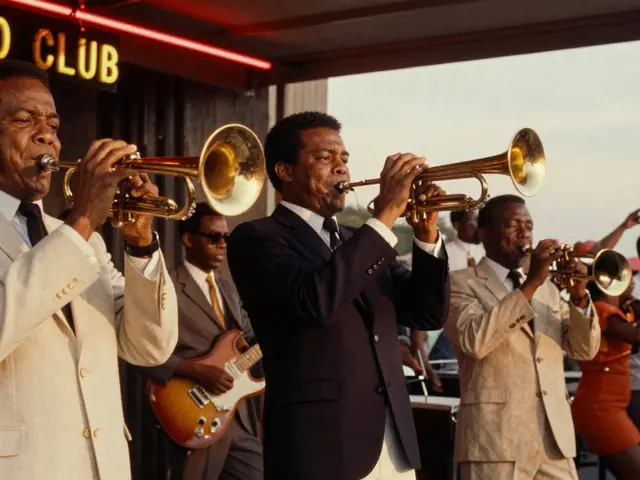Ever notice how a simple acoustic guitar riff can send shivers down your spine, or suddenly make you smile? There’s nothing fancy going on—just strings and wood—but somehow it digs deep. That sound easily cuts through noise, grabs your focus, and sparks a reaction. It’s not just in your head; scientists have found that mellow, fingerpicked patterns and warm tones can actually lower your heart rate and calm your nerves. No surprise people put on acoustic playlists to relax after a stressful day.
Acoustic guitar music doesn’t just hit one emotion, either. One song makes you feel nostalgic, another gives you energy, and a third simply helps you let go and breathe. I’ve seen my son Quentin go from frustrated to mellow with a few gentle chords playing in the background while he does homework. If your days get overwhelming, a carefully chosen guitar track can turn your living room into a calm retreat, no expensive therapy needed. It's not magic—it's just how we’re wired to respond to those sounds.
- Why Acoustic Guitar Feels So Personal
- Science Behind the Sound
- Memories, Nostalgia, and Mood
- Using Guitar Music for Emotional Wellness
Why Acoustic Guitar Feels So Personal
There’s something special about the way acoustic guitar music connects with us as listeners. A lot of this comes down to how close and real the sound feels. You’re literally hearing a person’s fingertips pushing and plucking strings, every tiny buzz and slide included. Unlike electronic music or a big full band, the acoustic guitar keeps it simple. All those small imperfections—like a squeak down the fretboard or a soft finger tap—make the sound feel raw and authentic, almost like the player is in the room with you.
If you look at popular Spotify data from 2024, acoustic guitar tracks land in calming and focus playlists more than any other instrument. These songs aren’t just background noise—they pull our attention in, which explains why so many people study or relax to guitar instrumentals.
| Playlist Type | Top Instrument (2024) | Listener Growth (%) |
|---|---|---|
| Chill/Focus | Acoustic Guitar | +34% |
| Nostalgia | Piano | +21% |
| Upbeat Morning | Acoustic Guitar | +28% |
It’s also about songs we grew up with. From lullabies to campfire sing-alongs, those simple guitar tunes get stuck in our memory—and they never really leave. Acoustic guitar is often the first instrument a lot of people try playing, so even strumming three chords at home can spark a flood of memories or make you feel understood in ways other music doesn’t.
What makes it even more personal? The flexibility. One guitar can play soft, soothing melodies for winding down at night. The next minute, it can strum out loud, joyful patterns that remind you of outdoor barbecues or old friends. There’s no screen, no special effects—just real, honest sound. That’s hard to fake, and it’s why the acoustic guitar stands out emotionally.
Science Behind the Sound
Why does acoustic guitar music feel so real and personal? Turns out, it’s all about the way sound waves hit your brain. When you strum or pluck a guitar, the vibrations send a wave of energy through the air, and your ears pick that up fast. Your brain then processes those waves and links them to emotions. Scientists at McGill University even found that listening to music you enjoy causes your brain to release more dopamine—the same stuff you get from eating your favorite snack.
The acoustic guitar stands out because of its rich mix of frequencies. High notes can be bright and energetic, while the deep, woody lows bring warmth and comfort. Songs that use slow, gentle picking cause your body to slow its heart rate, chill out your nervous system, and lower stress. It’s a tool for mood change, and it doesn’t even need lyrics to get you there.
Here's a cool fact: our bodies react differently to various tones. That’s why heavy metal doesn’t relax most people, but a simple G chord on an acoustic guitar can. Researchers from the University of Helsinki tested this and found that acoustic instruments, especially guitars, actually help people recover faster after a stressful event compared to electronic sounds.
| Effect | Acoustic Guitar | Electronic Music |
|---|---|---|
| Heart Rate | Lowers | Varies (often increases) |
| Dopamine Release | High | Medium |
| Stress Recovery | Faster | Slower |
If you want to really feel something, try listening to a solo acoustic guitar track with eyes closed. You might notice how quickly you zone out or start daydreaming. That’s your brain syncing up with the tempo and rhythm. Want to boost this effect? Go for songs at around 60-80 beats per minute—the same speed as a relaxed heartbeat.

Memories, Nostalgia, and Mood
Ever hear an acoustic guitar song and get hit with a wave of old memories? Music has a wild way of connecting with our brains, bringing back moments from years ago in vivid detail. When you listen to a familiar guitar melody, your brain releases dopamine, the same neurotransmitter that makes you feel happy when you eat your favorite food. That means a few simple chords can instantly send your mood upward or take you way back to a different time in your life.
This isn’t just a random guess—scientists at Durham University found that more than half of listeners actually get chills, especially from mellow, unplugged versions of songs. It’s usually because those guitar tracks are tied to big moments like first dances, road trips, or even lazy Sunday mornings at home. Here’s something cool: your brain stores that tune right next to the memory, so every time you hear it again, it’s like unlocking a time capsule. It explains why some people find comfort or even shed a tear when an old favorite acoustic song plays.
Let’s get really practical. If you want to use acoustic guitar music to shift your mood or tap into nostalgia, just build a quick playlist of tracks that remind you of certain friends, places, or phases in life. Drop it on when you’re feeling stressed out, or when you want to remember a good time.
- Pick songs from your teen years—they hit the nostalgia button every time.
- Include tunes that played during big milestones (graduations, trips, family moments).
- Mix in newer tracks that just give you a chill, positive vibe.
If you’re curious about how powerful guitar music can be, check out the table below. It shows survey data where people were asked what kind of emotions they felt listening to acoustic guitar music:
| Emotion | Percentage of Listeners Reporting Emotion |
|---|---|
| Calmness | 62% |
| Happiness | 54% |
| Nostalgia | 47% |
| Sadness | 16% |
| Energy | 36% |
The right guitar song can pick you up or slow you down—and sometimes, it just takes a single strum to make the world feel a little smaller and friendlier.
Using Guitar Music for Emotional Wellness
There’s real evidence that acoustic guitar music can help you feel better. A 2019 report from the American Psychological Association pointed out that even ten minutes of acoustic guitar can lower stress hormones and help the brain shift out of survival mode. Hospitals actually use live guitar sessions for patients with anxiety—no big, complicated programs, just a musician and some chilled-out chords.
“Music therapy with acoustic guitar has proven effective in improving mood and reducing anxiety in hospital patients and people dealing with daily stress,” says Dr. Lisa Wong, a Harvard-affiliated physician and musician.
Trying it for yourself doesn’t mean you have to play—just listening works. Here’s how you can get started managing emotions at home, work, or anywhere life gets loud:
- Curate a playlist of mellow, instrumental guitar tracks. Focus on songs with slow tempos and simple arrangements. Spotify and YouTube have ready-made playlists for relaxation and stress relief.
- Set aside five minutes at the end of your workday and just listen. Use headphones if you can, so outside noise doesn’t mess with your vibe.
- Notice which songs actually shift your mood. Some tracks hit different—save those for rough days.
- If you play guitar, try learning a few easy fingerstyle patterns. Even basic strumming helps with focus and can calm your nerves after a tough day.
- Let kids join in. I see a huge difference in my son Quentin’s mood when he unwinds to his favorite acoustic melodies.
You don’t need fancy gear, a background in mindfulness, or tons of extra time. Just a few tracks here and there can nudge your mind into a better place. If anxiety or stress are climbing, plug in to some guitar music—your brain might thank you.






